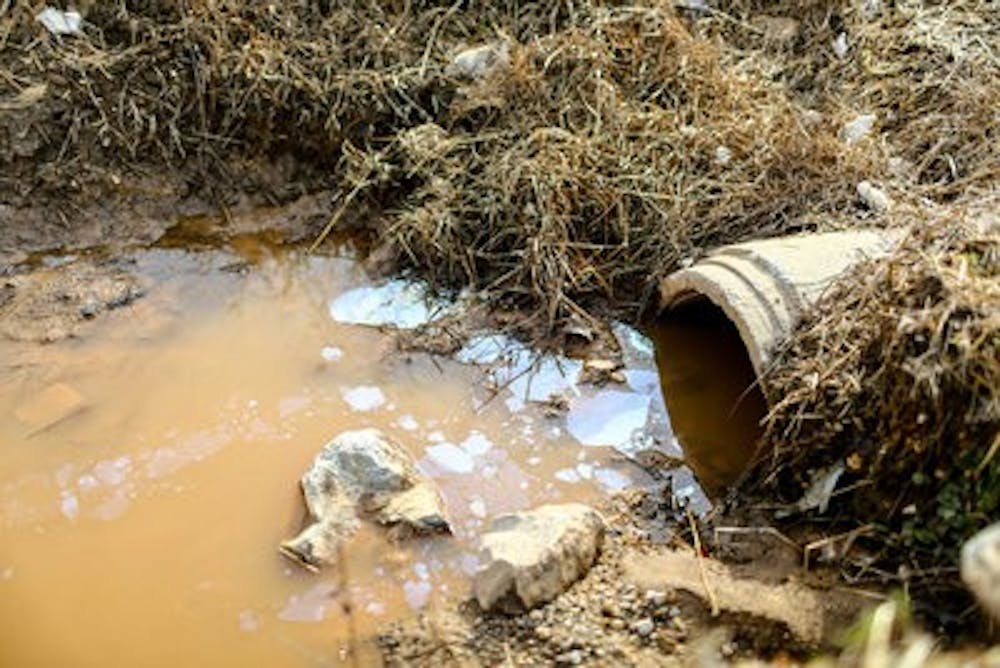Robert M. Ward knows his land well. He has been living on the same farm on Cecil Ward Road since his father bought it in 1950.
In April 2011, Ward went before the Auburn City Council with a complaint regarding pollution from Sand Hill Recycling Center, located near his property.
After seeing the problem had not been resolved, Ward went before the City Council again Jan. 6.
"The city of Auburn's trucks and other trucks go into this landfill and they come out," Ward said. "They've got these dual tires, so all that mud cakes in between their tires and it just slings it all out on the road."
Ward said Sand Hill Recycling uses street sweepers to remove the mud from the roads and sweep it into two creeks, Parkerson Mill Creek and Chewacla Creek, that run through his land.
Ward said there are federally protected mussels in Chewacla Creek that could be harmed by the mud.
"They're paying people, contractors, to sweep mud into city property, into the city drainage area that's coming right down here and affecting federally protected wildlife," Ward said. "The whole concept of having that place up there recycling is to better mankind and the environment, not to intentionally destroy it."
The federally protected mussels in Chewacla Creek are Hamiota altilis, according to James Stoeckel, associate professor in the School of Fisheries and Aquatic Science with a specialization in molluscan and crustacean ecology.
Stoeckel said the mussels are upstream from the recycling plant.
"They're considered threatened in terms of the risk of extinction," Stoeckel said. "Their populations are very low."
Stoeckel listed three ways excess sedimentation in the streams could harm the mussels: feeding patterns, reproduction and smothering.
"Mussels are filter feeders, and so if you get too much mud in the creek for too long of a time, it can interfere with their feeding because they tend to filter food particles out of the water column," Stoeckel said. "You're just getting all this nastiness with that food."
Stoeckel said research shows mussel species can have trouble reproducing when the concentraction of suspended soils in the water column becomes too high.
"When we did experiments in ponds and suspended solids levels got above about 15-20 milligrams per liter," Stoeckel said. "We had severe reductions or even complete failure of reproduction for that year."
The third way the excess sedimentation can harm the mussels is by smothering them once the sediment settles in the bed of the stream, Stoeckel said.
"Sedimentation is a big problem sometimes," said Claude Boyd, professor of agriculture and water qualities specialist. "Some of it's natural, but you know excess sedimentation in streams is considered ecologically undesirable."
Timothy Woody, director of environmental services in Auburn, said the city has been using Sand Hill Recycling for 15 years to dispose of construction and demolition debris along with yard waste.
At the City Council meeting Jan. 20, the council renewed a three-year contract with them.
Woody said their concern is if the facility has the appropriate permits through the Alabama Department of Environmental Management.
"Their facility is outside of the city limits, so it's outside of our purview," Woody said. "It's up to those regulatory agencies to deal through those processing and disposal facilities in terms of making sure they adhere to those permits."
Ward said when he brought the issue in front of City Council for the second time, they told him it was a Lee County issue.
Justin Hardee, Lee County engineer, said the county does not have the ability to police this type of activity, but that authority falls under the Alabama Department of Environmental Management.
Lynn Battle, spokeswoman for ADEM, said they sent someone to inspect Sand Hill Recycling, without giving the company any prior notice.
The inspection report was not completed in time for the publication of this article, according to Battle.
Ward said in his past experiences with ADEM, they did not use enforcement as part of their program.
"I don't want to say anything bad about ADEM, but I'd almost call them a toothless tiger," Ward said.
Ward said an employee from Sand Hill Recycling gave him a tour of their property after learning of his complaints, showing Ward how they were cleaning up the mud that had been on the streets and replacing it with sand.
"If they're going to come pick me up and show me the improvements that they've done, then that in itself is an admission of guilt," Ward said. "If they felt like they were 100 percent compliant, then they'd say, 'Hell, I'll see you in court.'"
Sand Hill Recycling employees were unavailable for comment by publication time.
Do you like this story? The Plainsman doesn't accept money from tuition or student fees, and we don't charge a subscription fee. But you can donate to support The Plainsman.





